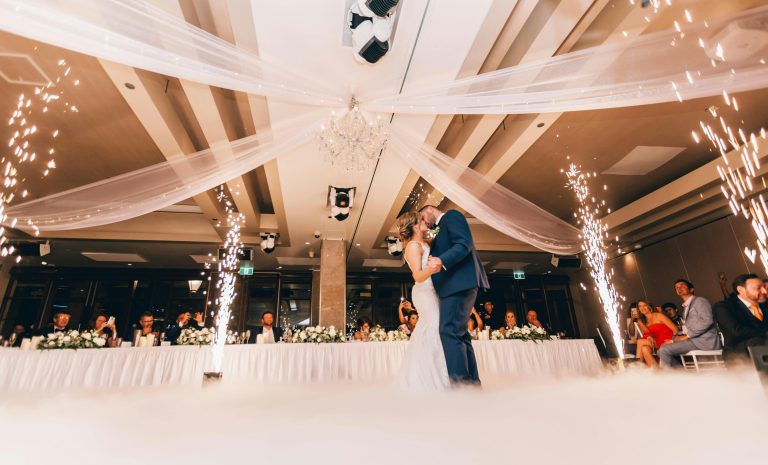Introduction
Planning an outdoor wedding ceremony? The natural beauty of open-air venues creates magical moments, but outdoor wedding music requires special considerations that indoor ceremonies don’t face. As a professional wedding musician who’s performed at countless outdoor celebrations, I’ll share the essential factors that ensure your ceremony’s soundtrack is as perfect as your chosen setting.
Want to get reccommendation from our wedding music directors? Live chat to us now.
Understanding Outdoor Acoustics
Unlike indoor venues with controlled sound environments, outdoor spaces present unique acoustic challenges. Sound travels differently in open air, often dissipating more quickly without walls to contain and reflect it. What sounds perfect during a quiet rehearsal might barely reach guests in the back rows during your actual ceremony.
Natural elements significantly impact how music travels. Trees can absorb sound, creating intimate acoustic pockets, while water features might add competing background noise. Hills and valleys can create natural amplification or dead zones where sound doesn’t carry well. Understanding your venue’s specific acoustic properties helps determine whether acoustic instruments alone will suffice or if amplification is necessary.
Weather Considerations for Outdoor Wedding Music
Mother Nature is your biggest wildcard when planning outdoor ceremony music. Even seemingly perfect weather conditions can present challenges for musicians and their equipment.
Wind Effects Gentle breezes can carry sound away from your guests, while stronger winds create competing noise through rustling leaves or tent fabric. Wind also affects acoustic instruments directly – guitarists may struggle with string stability, and sheet music becomes difficult to manage.
Temperature and Humidity Extreme temperatures affect instrument tuning and performer comfort. High humidity can impact acoustic guitar strings and sound quality, while cold weather affects finger dexterity for instrumentalists. Plan for weather-appropriate setup times and potential instrument adjustments.
Rain Backup Plans Always have weather contingencies that include covered areas for musicians and their equipment. Electronic amplification requires protection from moisture, even light rain. Many couples choose partially covered venues or tent rentals specifically to protect their music setup.
Choosing the Right Instruments for Outdoor Settings
Acoustic instruments naturally complement outdoor wedding ceremonies, requiring no power sources and blending beautifully with natural surroundings. However, your choice depends on guest count, venue size, and acoustic conditions.
Acoustic Guitar: The Outdoor Favorite Acoustic guitar remains the most popular choice for outdoor wedding music. The warm, organic sound works perfectly in natural settings, and skilled guitarists can adjust their playing dynamics to match the space’s acoustics. For intimate gatherings under 50 guests, solo acoustic guitar often provides ideal volume without overpowering the natural ambiance.
String Instruments Violin, cello, and small string ensembles excel outdoors, offering elegance and natural volume that travels well in open spaces. These instruments typically don’t require amplification, making them reliable choices regardless of power availability.
When Amplification is Necessary Larger guest counts or challenging acoustic environments may require sound reinforcement. The key is using amplification to enhance rather than overpower natural sound, ensuring every guest can hear your carefully chosen processional songs.
Sound System Essentials
Even acoustic performances sometimes benefit from subtle amplification to ensure consistent sound coverage throughout your ceremony space.
Power and Equipment Outdoor sound systems require reliable power sources through venue electricity, generators, or battery-powered equipment. Professional musicians typically bring backup equipment and have contingency plans for common outdoor challenges like power issues or weather exposure.
Speaker Placement Proper speaker positioning ensures even sound coverage without creating dead zones. Natural barriers like trees and water features can absorb or reflect sound, so equipment placement should work with rather than against these elements.
Volume Balance The goal isn’t to overpower nature but to blend your musical choices with natural ambient sounds. Birds singing or water flowing can actually enhance your ceremony when music is balanced appropriately.
Song Selection for Outdoor Ceremonies
While any song can be performed outdoors, certain choices work better with open-air acoustics and natural settings.
Acoustic-Friendly Selections Songs with clear, defined rhythms help guide processional timing in outdoor spaces. Gentle melodies work beautifully for garden settings, while more upbeat selections can energize beach or mountain ceremonies. Consider how your chosen songs will sound with natural reverb patterns.
Seasonal Appropriateness Match your music selections to your ceremony’s season and time of day. Dawn ceremonies might call for gentle, awakening melodies, while sunset celebrations could benefit from more dramatic, romantic choices.
Working with Professional Musicians
Hiring the right musicians for outdoor weddings means finding professionals who understand open-air performance challenges.
Experience Matters Look for musicians who regularly perform outdoor weddings and understand the logistics involved. Experienced outdoor performers know how to adjust their setup for different weather conditions and work with natural acoustics.
Equipment and Setup Discuss equipment needs thoroughly with potential musicians. Professional outdoor musicians typically have experience with weather protection, power requirements, and extended setup times that outdoor venues often require.
Timeline Coordination Outdoor ceremonies often have more complex timing requirements than indoor events. Musicians need to coordinate with photographers and wedding planners to ensure smooth setup and performance.
Venue-Specific Considerations
Different outdoor venue types present unique opportunities and challenges for wedding music.
Beach Ceremonies Ocean sounds and salt air affect both instruments and sound projection. However, the natural rhythm of waves can create beautiful accompaniment to the right musical choices.
Garden and Park Settings Lush vegetation affects acoustics by absorbing sound, creating intimate spaces but potentially limiting projection. Garden venues often have established noise restrictions to consider.
Mountain and Open Field Locations Elevated locations can offer natural amplification, but weather patterns and wind at higher altitudes require special preparation from musicians.
Budget Planning for Outdoor Music
Outdoor weddings sometimes require additional music-related expenses that indoor ceremonies don’t encounter.
Additional Equipment Costs Depending on your venue, you might need to rent sound equipment, power sources, or weather protection. Factor these potential costs into your music budget early in planning.
Travel and Setup Fees Remote outdoor venues may incur additional travel charges or extended setup fees due to the extra time and effort required for outdoor performances.
Creating Backup Plans
Every outdoor wedding needs comprehensive contingency plans, especially for music.
Weather Alternatives Develop clear backup plans for different weather scenarios, including covered performance areas and alternative equipment options. Communicate these plans with your musicians and wedding party.
Equipment Redundancy Ensure your musicians have backup instruments and equipment for potential technical challenges or weather-related issues.
Seasonal Timing Impact
Your wedding season significantly affects outdoor music options and requirements.
Spring and Fall Mild temperatures create ideal conditions but can be unpredictable, requiring flexible backup plans and weather-appropriate equipment.
Summer Ceremonies Heat affects both instruments and performer comfort. Consider ceremony timing to avoid the hottest parts of the day, and ensure musicians have adequate shade.
Winter Weddings Cold weather presents unique challenges for instrument tuning and performer comfort, but can create magical moments with proper preparation.
Bringing It All Together
When planned thoughtfully, outdoor wedding music creates moments that can’t be replicated indoors. The combination of natural beauty, meaningful music, and proper acoustics produces unforgettable memories.
Success comes from thorough planning, realistic expectations, and working with experienced professionals who understand outdoor wedding music challenges. Consider all environmental factors, have backup plans ready, and choose musicians who can adapt to changing conditions.
Remember that flexibility and professional guidance are essential for creating the magical musical moments you’ve envisioned. With proper planning and the right team, your outdoor wedding music will be as beautiful and memorable as your chosen natural setting.
Your outdoor ceremony deserves music that enhances rather than competes with nature’s beauty. By understanding these key considerations and working with experienced outdoor wedding musicians, you’ll create the perfect soundtrack for your special day.
For professional guidance on planning your outdoor wedding music, contact BW Wedding Music. With extensive experience performing in diverse outdoor settings, we’ll help ensure your ceremony’s soundtrack complements your beautiful venue perfectly.




